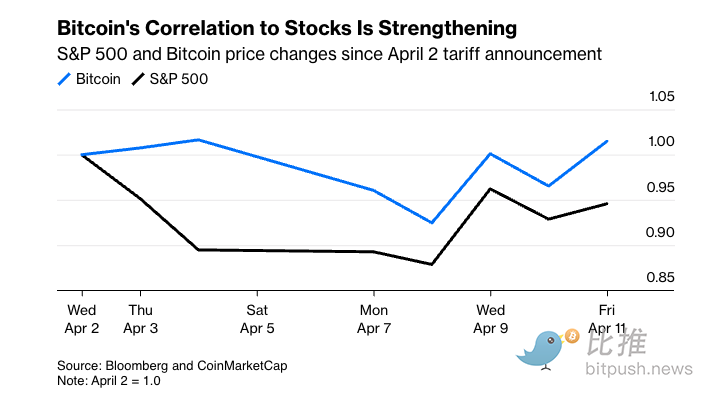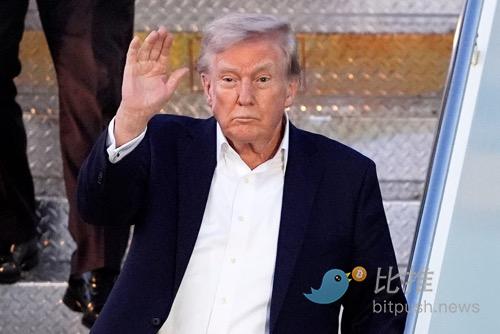Since U.S. President Donald Trump announced the "Liberation Day" tariff policy on April 2, the correlation between stocks and cryptocurrency assets has been increasing, becoming a focus for investors. Some interpret this as evidence that the initial tariff policy was not "good," and postponing its implementation is a "good thing" because people might fear that tariffs could lead to an economic recession. Unfortunately, many analyses sound more like partisan disputes rather than calm economic analysis.
If we delve into the timeline, we'll discover a more dangerous signal: the real crisis is not from international trade disputes or economic recession expectations, but potentially from the "U.S. dollar" itself, which is cause for concern.
Recently, the financial market seems to have gone through three reaction stages.

S&P 500 Index and Bitcoin price changes since the April 2 tariff announcement, source: Bloomberg and CoinMarketCap, note: April 2 = 1.0
The post-trading on April 2 and the following two days were driven by concerns about disruptions in financial markets, trade flows, and international relations - unfavorable for stocks but favorable for cryptocurrencies. Over the weekend and until Trump partially reversed course on April 9, investors became worried about a global economic recession. Since this shift, concerns seem to have focused on the dollar's value.
All of this should come with a caveat that immediately interpreting market movements is dangerous. Understanding what the market is saying might take months or even years, and we often can never fully comprehend it. The market is trying to value cash flows for the next several decades, with so many changes happening simultaneously that factors affecting the stock market today often only appear in headlines much later.
An exception is news with certainty, such as Federal Reserve rate decisions, major economic statistical releases, and natural disasters.
We know when the market receives information and can measure reactions within seconds or minutes without being affected by noise accumulated over a day or longer. However, Trump's tariff news does not meet many conditions, including the complexity of tariffs, which requires time to digest and assess reactions.
The initial market response to the "Liberation Day" announcement was a decline of less than 1% in the first 10 minutes of after-hours trading, but the S&P 500 index plummeted 10.5% over the next two days. Bitcoin was rising at the time. These changes occurred as the market digested foreign reactions and conducted a more thorough analysis of consequences. Moreover, there were significant indirect impacts. Aggressive tariffs indicated that Trump would take swifter and more intense actions in his overall plan - potentially even recklessly - including reducing costs through government efficiency departments, relaxing regulations, and strengthening immigration enforcement. Such unilateral major actions seemed likely to undermine international cooperation and goodwill.
Something changed over the weekend - the second stage.
On Monday and Tuesday, stock market movements were minimal, but Bitcoin prices dropped significantly. While trade wars, international tensions, protectionism, capital controls, and financial repression are favorable to Bitcoin, a global economic recession could potentially harm Bitcoin even more severely than stocks.
An important background is that economic fragility has existed since the global economy began recovering from Covid. During Biden's presidency, the U.S. was close to stagflation, and most economists predicted an economic recession when the Federal Reserve began actively raising interest rates to curb inflation. When Trump was elected, the recession probability was around 25% and has been increasing since.
The tariff announcement concretized these concerns. Investors did not believe tariffs themselves would cause an economic recession, but in a fragile situation, tariffs might be sufficient to trigger a recession and make it longer and deeper than originally anticipated.
Since Trump partially reversed his decision to raise tariffs on dozens of trading partners, the correlation between stocks and cryptocurrencies has been far higher than news could reasonably explain - the third stage.
When we've seen such situations in the past, it was usually the U.S. dollar causing these fluctuations. Both stocks and cryptocurrencies are denominated in dollars, so if the dollar depreciates, they both rise; if the dollar appreciates, they both fall. The dollar value discussed here is not measured by the Consumer Price Index (CPI) or foreign exchange rates, but refers to investors' feelings about holding dollars and dollar-denominated assets like bonds, compared to holding assets like stocks and cryptocurrencies.

Tariffs typically reduce the attractiveness of holding currency relative to non-monetary assets. Americans can buy less with their dollars, and equivalent tariffs mean foreigners can also buy less with their currencies. More generally, any interference with the free market tends to devalue currency. Conversely, international tensions and trade disruptions might make the dollar more valuable during "safe-haven" behavior, despite reduced purchasing power. A financially more confident United States could have a similar effect on the dollar.
In any case, when Trump retreated, both stock and cryptocurrency investors seemed to perceive the dollar as devalued, causing both asset types to rise synchronously, a pattern that continues.
Given the current turbulent uncertainty, predicting when the market will enter the next phase of decline and when the correlation between stocks and Bitcoin might change would require crystal ball-like predictive abilities.
What does this mean for the future?
The tariff dispute might persist for months, even throughout Trump's presidency. A temporary pause has already eased tensions and reduced the likelihood of economic recession or major international conflict. If the U.S. government can stabilize policies, this issue might disrupt markets and politics for a period, then gradually become insignificant - even if the fundamental conflicts are never resolved.
The deeper issue lies in Trump's hardline stance and his willingness to listen to mainstream advisors. The next time something similar happens - and I believe there will be a next time - I expect the stock market to react more quickly and negatively, while cryptocurrencies will rise. This drama is primarily driven by economic factors related to tariffs and diplomacy. Next time, investors will view it as another episode in a long-term script. Why worry about the long-term economic impacts of policies that change or even reverse daily?
Before Trump calms down or leaves the White House office, politics, rather than economics, may be the primary driver of financial market volatility.







